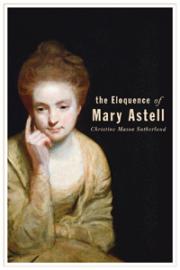The Eloquence of Mary Astell
Éditeur : University of Calgary Press
ISBN numérique PDF: 9781552384596
Parution : 2006
Catégorisation :
Livres numériques /
Autre /
Autre /
Autre.
Formats disponibles
| Format | Qté. disp. | Prix* | Commander |
|---|---|---|---|
| Numérique PDF Protection filigrane*** |
Illimité | Prix : 44,95 $ |
*Les prix sont en dollars canadien. Taxes et frais de livraison en sus.
***Ce produit est protégé en vertu des droits d'auteurs.
Description
The Eloquence of Mary Astell makes an important contribution to the knowledge and understanding of the important role that women, and one woman in particular, played in the history of rhetoric. Mary Astell (1666-1731) was an unusually perceptive thinker and writer during the time of the Enlightenment. Here, author Christine Sutherland explores her importance as a rhetorician, an area that has, until recently, received little attention. Astell was widely known and respected during her own time, but her influence and reputation receded in the years after her death. Her importance as an Enlightenment thinker is becoming more and more recognized, however. As a skilled theorist and practitioner of rhetoric, Astell wrote extensively on education, philosophy, politics, religion, and the status of women. She showed that it was possible for a woman to move from the semi-private form of rhetoric represented by conversation and letters into full public participation in philosophical and political debate.























